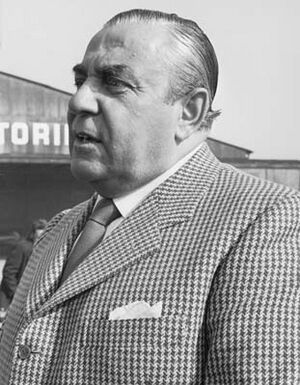Lucius Geta
This article is incomplete because it is pending further input from participants, or it is a work-in-progress by one author. Please comment on this article's talk page to share your input, comments and questions. Note: To contribute to this article, you may need to seek help from the author(s) of this page. |
Lucius Geta | |
|---|---|
 Geta in 1955 | |
| Born | Lucius Antoninus Geta August 21, 1901 |
| Died | June 17, 1993 (aged 84) |
| Nationality | |
| Occupation | founder of Phaeton |
Lucius Antoninus Geta (21 August 1901 – 17 June 1993), better known as Lucius Geta, was an automobile designer and founder of the Stabulum Phaethonti racing team and subsequently the Phaeton brand. Born to an aristocratic Hesperidesian family, he helped furnish an image of dashing panache and chivalry for the fledgling automobile industry in the Empire of Exponent, frequently depicting automobile drivers - and especially race car drivers - as knights of the road. To this end, he directed that his vehicles follow a similar design pattern, exuding a sense of aristocratic elegance and strength.
Early life
Lucius Antoninus Geta was born in < place > on 21 August 1901, the third son of < name >. According to his autobiography, he developed a fascination with medieval knights during his early childhood, and would often run around the family estate portraying himself as one. Geta's obsession with cars and racing began at the age of 8, when the family attended a motor race in < place >. From then on, he wanted to become a racing driver.
Geta began racing in 1924 for FME, later joining Angelbridge in 1926. He won three races at his peak in 1928, but slowly began to devote less and less time to racing upon the birth of his eldest daughter. However, he wished to continue participating in motorsport. Using his connections, he assembled a group of mechanics and racing drivers together and founded Stabulum Phaethonti in 1932. The team proved to be successful thanks to a combination of superstar drivers and the dominant Angelbridge T4. However, the 2nd Great Astyrian War put a temporary end to racing, and so the team was in financial trouble.